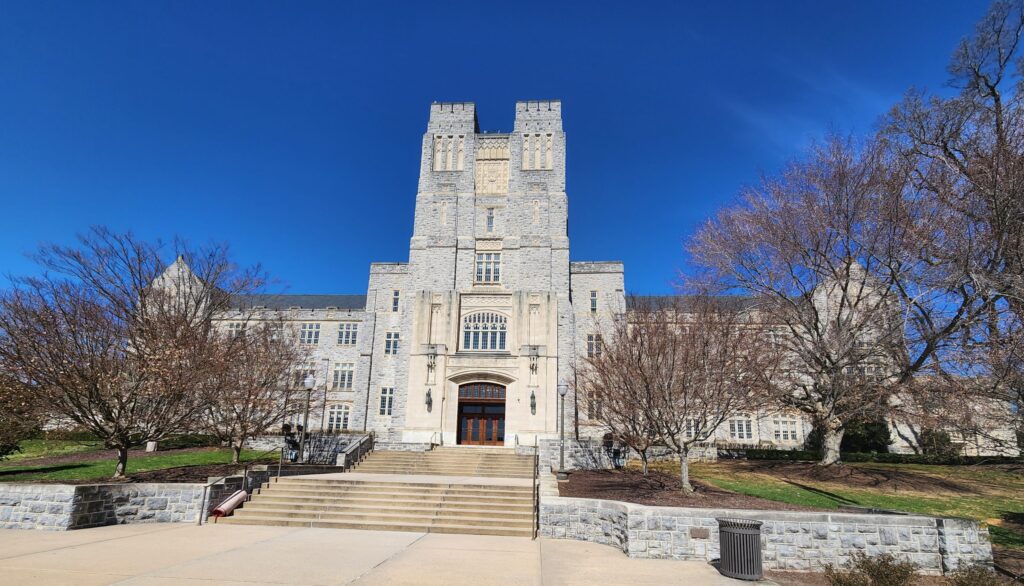Virginia Tech will increase tuition by 2.9% for the 2024-2025 academic year, a decision unanimously decided by the school's Board of Visitors at a meeting Tuesday that was briefly interrupted by student protests.
Tuition will increase by $372 to $13,153 for in-state undergraduates, and $982 for out-of-state undergraduates, bringing annual tuition to $34,376.
Tuition for graduate students will also increase by 2.9%, with the exception of students at Virginia-Maryland College of Veterinary Medicine and Virginia Tech Carilion School of Medicine, who will each see their tuition increased by 2.5%.
“The board does not take these steps lightly,” President Edward Bain said after the vote. He said the board continues to balance the needs of students, faculty and staff with the university's goals, including “ensuring that Virginia Tech continues to be a leader in everything we do.”

The comprehensive fee (a mandatory annual fee that covers student services such as student health and counseling services, student activities, transportation and wireless internet, and athletics and recreational sports) will increase by 3.8% ($99) to $2,684 per year. It becomes a dollar.
President Tim Sands praised the board for approving modest tuition and fee increases despite high inflation and uncertainty over funding in the still-undefined state budget.
The total student population at Blacksburg State University is approximately 38,000. Approximately 30,000 of them are undergraduate students.
Virginia Tech set a record for the number of applicants for fall 2024, receiving more than 52,000 applicants for approximately 7,000 total freshman spots. This spring, the school will postpone the deposit deadline for new students from May 1 to May 15 in light of the start of the new federal student aid application process, making financial aid decisions for many students nationwide. is late.
The university is taking steps to make federal student aid more affordable for some students. This includes the Virginia Tech Advantage Initiative, which aims to close the gap between financial aid and tuition for up to 5,500 students. Additionally, returning undergraduate students with household incomes of less than $100,000 will not see tuition increases thanks to the Future Fund program, which helps make up the difference.
But, for example, the Fund for the Future can only be applied to tuition and fees. The university is also raising prices on other aspects of attendance.
Lodging rates increase by 4% or $245 to $467 per year, depending on housing category. Meal plans increase by 7%, or between $367 and $421, depending on the student's plan.
In total, the total annual cost for the majority of Virginia students living on campus will increase by $1,086 to $28,308. For most out-of-state students, that's an increase of $1,696, bringing him to $50,135.
Virginia Tech tuition has increased at about half the rate of national consumer price inflation over the past five years, the university argued in a filing with the Board of Regents. During that time, universities have absorbed the effects of inevitable inflation, including wage pressures and rising utility costs.
Technical College has the lowest overall tuition among four-year public schools in Virginia, according to a table provided by the school. However, compulsory tuition fees remain a point of contention between universities and students, especially graduate students.
In comments submitted to a March public hearing sponsored by the university, graduate student Oliver Shuey said, “I was fortunate enough to receive assistantship funding through the department, but the cost of living made it difficult for me to receive assistance.'' “The level of this is still insufficient.”
He noted that from 2023 to 2024, about $210 of about $1,100 in biweekly gross income was deducted from graduate assistant salaries to cover comprehensive expenses.
“While I understand that graduate education is a privilege, I find it demoralizing to live paycheck to paycheck while studying at a globally ranked university.”
Sands' remarks at Tuesday's board meeting were briefly interrupted by about a dozen protesters who shouted for university leaders to “choose sides: human rights or genocide” in the war between Israel and Hamas. . Pro-Palestinian groups held placards calling on the university to withdraw from sources that could contribute to Israel's military presence in Gaza.

The group was seated behind Sands, but Sands approached them and stated that the meeting needed to continue. But as the chants continued, Sands had campus police escort the protesters from the room. A university spokesperson announced Tuesday afternoon that no arrests had been made.
Sands supports the student movement, but said the movement disrupted the conference. “I don't appreciate being interrupted,” he said.
After Sands finished speaking, a protest outside Torgersen Hall continued for about 10 minutes, chanting “Free, Free Palestine,'' and shouts could be heard through the windows.


